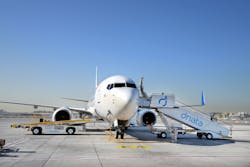dnata’s Vision for Environmental Efficiency
From renewable energy and green ground support equipment (GSE) to reducing food waste, dnata has recently announced it will be making a $100 million investment in green operations in the next two years.
The global air and travel services provider aims to reduce its carbon footprint by 20 percent by 2024 and by 50 percent by 2030. Reductions will take place through ongoing investments in infrastructure, equipment and process improvement.
“We’ve been making great progress on reducing our carbon footprint, minimizing waste and reducing energy and water consumption across our operations,” dnata Group CEO Steve Allen said when the announcement was made in June. “We will further increase our investments and efforts in strong cooperation with our partners to achieve our targets and preserve the environment for current and future generations.”
To determine how the funding for green projects should be spent, dnata has established an investment review board.
“The board meets quarterly and reviews a range of proposed investments from across our businesses,” says a dnata spokesperson. “Projects are selected depending on the need and potential impact based on a number of factors including environmental impact, regulatory requirements and operational needs.”
Choosing green options is a prime consideration for dnata officials when fleet planning.
dnata has increased investments in electric and hybrid ramp GSE and forklifts, and refurbished existing GSE with new technologies to further decrease emissions and update them to the latest safety and quality standards.
“We have a strategy to convert light vehicles (cars, forklifts, baggage tractors) in our fleet to electric where feasible,” the dnata spokesperson says. “In terms of larger equipment where the technology is less mature, we are working with manufacturers and testing and proving the effectiveness of new technologies in our operations.”
In Singapore, dnata has partnered with industry leaders for the gradual replacement of old diesel equipment with a more sustainable asset base, including electric GSE (eGSE). Already in place are 44 electric baggage tractors, including 39 Charlatte T135 EVO models provided under TCR’s full service GSE rental solution and five Toyota 3TE25 models via UMW.
Across the company’s operations, its forklifts for cargo operations are predominantly electric. Light vehicles used as support vehicles for various operations are also electric, as well as some of the larger power equipment, including electric trucks in dnata’s UK cargo operations and pushback tractors used in UAE airport operations.
At dnata facilities, recent investments have advanced technologies to optimize resources and improve operational efficiency.
In Singapore, the company has installed a 3.5 megawatt-peak rooftop solar power system across its operations, including its cargo and catering facilities, at Changi Airport.
The rooftop power plant is comprised of more than 6,500 individual solar panels and will generate more than 4,300 megawatt hours of green power a year, enabling dnata to reduce its electricity-related carbon emissions by 20 percent annually in Singapore.
In London, a new cargo center near London Heathrow Airport is part of the company’s “dnata City East” complex. dnata City East incorporates the latest carbon reduction initiatives in design and operation, including the use of solar PV panels, air-source heat pumps and electric vehicle charging. dnata City East has achieved a BREEAM “Excellent” environmental rating for its design and the same status is expected to be achieved for the construction process.
The company will also incorporate carbon reduction initiatives in the construction and operation of its recently announced new cargo centers in The Netherlands and Iraq.
A cargo warehouse, expected to open at Erbil International Airport, in 2023, will include environmentally sustainable features such as water harvesting, low energy lighting and an all-electric forklift fleet.
In Amsterdam, a fully automated cargo center, dnata Cargo City Amsterdam, at Amsterdam Airport Schiphol (AMS) will make use of seven intelligent automated guided vehicles (AGV) to enable flexible and scalable ULD transport within the terminal. These AGVs, which represent a recent product innovation of Lödige Industries, will be applied here for the first time on a large scale.
Another special feature will be the implementation of smart gates, which automatically record the volume and weight of all incoming consignments by scanning them in 3D, thus significantly speeding up handling and improving the quality of service.
Food Waste
The worldwide focus on reducing carbon emissions doesn’t necessarily bring to mind food waste. But with approximately 30 percent of all food produced globally going to waste, dnata is focused on reducing food waste through process improvement.
“We do this through a variety of strategies including food donations, product design (using whole product/byproducts), reducing waste to landfill through on-site processing and introducing pre-ordering to optimize loading for in-flight catering services,” a dnata spokesperson said.
Increasingly, dnata is working with many of its airline customers to analyze consumption trends and use predictive data to optimize the loading of food and beverage for in-flight retail catering.
“We have seen food waste reduce by as much as 50 percent in one of our operations following the introduction of weekly, and sometimes daily optimizations from understanding trends. Analysis of on-board sales data not only reduces waste but also fuel burn associated with carrying excess weight,” the spokesperson says.
“We recognize our responsibility in preserving our planet’s resources and are committed to minimizing the environmental impact of our operations across all our businesses and activities, including our supply chain, as outlined in our environmental policy.”
Green Turnarounds
In 2020, dnata became the first ground handler to complete a green aircraft turnaround in the United States. A Viva Aerobus Airbus A320 used zero-emission GSE at JFK’s Terminal 1. During the green turnaround, dnata’s team transported baggage with electric baggage tractors to the aircraft and applied electric conveyor belts to offload and load baggage and cargo. dnata’s staff pushed the aircraft back from the gate with a Mototok electric, remote controlled towbarless pushback tractor, positioning it ready for taxi and departure.
In 2019, dnata ensured smooth and safe turnaround of a flydubai Next-Generation Boeing 737-800 aircraft using only zero-emission ramp ground support equipment (GSE) at Dubai International’s (DXB) Terminal 2. During the green turnaround, dnata’s team transported baggage with electric baggage tractors to the aircraft and applied electric conveyor belts to offload and load baggage and cargo. The passengers of the airline’s Karachi and Faisalabad flights were disembarked and boarded through towable passenger stairs. After the boarding had been completed, the ground handler’s staff pushed the aircraft back from the gate with an electric towbarless pushback tractor, positioning it ready for taxi and departure. Throughout the turn, the aircraft ground power was provided by Dubai International’s FEGP (fixed electrical ground power).
About the Author
Rebecca Kanable
Assistant Editor
Rebecca Kanable, a veteran journalist, worked with Endeavor Business Media's aviation group from 2021 to 2024 as assistant editor of Airport Business, AMT and Ground Support Worldwide. She previously worked for various publications, including trade magazines and newspapers.

